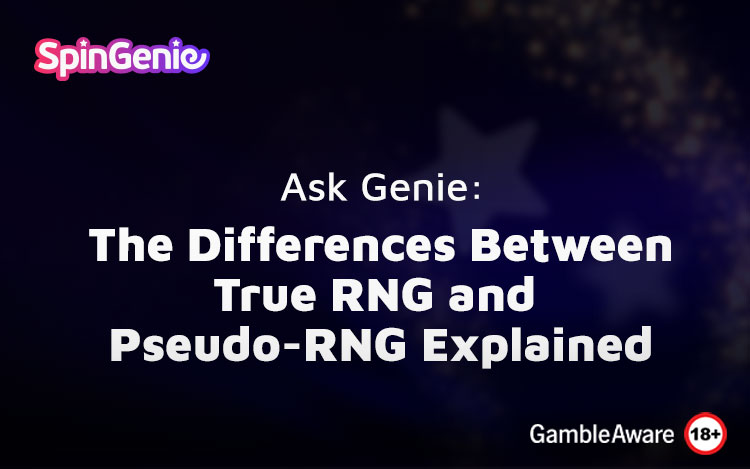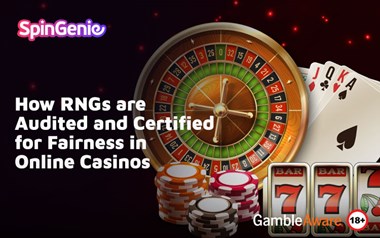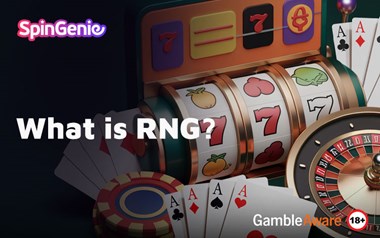A random number generator or ‘RNG’ is an essential part of all online casino games. This piece of software helps to ensure random outcomes that form no predictable pattern and therefore are fair. But did you know that RNG comes in two forms? In today’s article we’ll be learning the difference between pseudo random number generators and true random number generators, so you can add to your online casino knowledge base.
True RNG and Pseudo-RNG; What’s the Difference?
While you might have thought of RNG as one nifty piece of software, it is actually far more complex and has two subsections.
- HRNG (Hardware Random Number Generator) is commonly referred to as a 'True Random Number Generator'
- PRNG refers to a pseudo-random number generator.
Although they employ somewhat distinct techniques, the two approaches have one aim: generating a series of random numbers. Let's take a closer look at each type.
True RNG (HRNG)
HRNG, or ‘true’ RNG is a piece of physical hardware driven mechanically to create randomness. Usually, the physical gadget measures certain environmental signs to generate an unanticipated outcome. The appliance generates the final output by measuring and translating them into values. These end values are not predictable, hence the outcome is random.
In a very literal sense, the dealer in a physical casino venue could be described as an example of true RNG, as the human element makes how the cards are dealt or the result of the wheel spin completely random.
Pseudo-RNG
Normally 'pseudo' has negative connotations, but in the case of pseudo-RNG and its application within online casino games, this is a positive term.
PRNG is a software tool designed to generate a random number sequence using a specified value (or condition) which is most often referred to as a 'seed'. The PRNG just needs the algorithm itself and the seed number; it does not need any outside influence to generate a result as follows:
- The seed acts as a key to reveal the spectrum of outcomes that are possible for the algorithm to use.
- The algorithm, known as a ‘hashing algorithm’ then takes this data and applies its preset conditions (such as mathematical models including RTP, volatility, and variance) to form the output. Instead of representing this in numbers, the outcomes generated are usually subject to the program the software is being used for. In the case of slots, each value generated is matched with a ‘tile’ (a spot on the reels), and an image (in this case a symbol used in the game.
- Then the outcome is presented, in our context, to the player. With all this mathematical magic taking place within the few seconds it takes for the reels to spin and stop!
Ensuring Fair Play: iGaming Certification
Of course, as PRNG is software, players might have concerns regarding hacking which could allow for the rigging of games. This is why third-party RNG audits are a commonplace procedure within the online casino world. These independent bodies validate that every game operates on fair terms and is incorruptible.
RNG is thus the basis of online gaming, which enables operators and game providers to use a "provable fairness" approach which reassures and empowers players thanks to its transparency.
On the whole, a third-party audited game hosted at a licensed casino is very, very, unlikely to have its RNG software manipulated. If a site or developer were to be caught the loss of reputation, fines, and even criminal action would far outweigh any benefits gained. The only external factor which can influence RNG software is random chance, commonly referred to by players as good old-fashioned ‘luck’.
But who are these auditing bodies? Let’s take a closer look at the most well-known examples:
- BMM Testlabs: Has been in the business for over 30 years and is one of the most respected authorities. It works with casinos across many jurisdictions and can test any form of online casino game.
- iTech Labs: Has been around since 2004 and works with brands in America, Asia, and Europe. The brand emphasises the laws and limits of particular countries to guarantee that the game content of its customers conforms with current licencing criteria.
- Gaming Labs International: GLI certificates are sought after by iGaming companies since they are approved in controlled markets worldwide.
- eCogra: As it is based in London, eCogra (eCommerce Online Gaming Regulation and Assurance) is probably the most well-known body to UK players. It checks systems and software used in online betting to protect player rights, ensuring fair games, and verifying provider accountability comes first.
Play Your Favourite Fun and Fair Casino Games at Spin Genie!
At Spin Genie we’re licensed and regulated by the UK Gambling Commission (UKGC), and all our games have been audited and tested by iTech Labs. This means you can enjoy your favourite games at a legit online casino here with us, completely worry-free. Sign up and play today, have fun, and always gamble responsibly.













